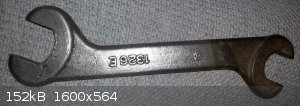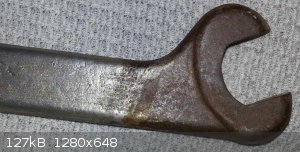RogueRose
International Hazard
    
Posts: 1595
Registered: 16-6-2014
Member Is Offline
|
|
Gentle rust removal w/o nasty residues
I have a lot of old hand tools that vary in how rusty they are and I've tried a number of methods of rust removal and they all have their down sides,
some being a real PITA. The methods are oxalic acid solution, vinegar and molasses solution. It seems that the molasses solution does the best job
for removing the rust without leaving behind a fine black coating with the vinegar or a fine yellow coating with the oxalic acid, both of which are
not water soluble and need to be scrubbed off with soap and water - and the black residue, whether carbon or iron acetate, is rough on the hands.
With the molasses solution I added about 5% vol of molasses to tap water - so 5ml molasses to 95ml H2O. You could use more molasses but I throw it
out after the soaking. The amount of rust on the metal will determine the soak time, but I found that you can't really soak too long (within reason I
guess) where with the acids, you can end up with thick coatings on them and pitted metal. I usually let soak for 24-48 hours.
After soaking I washed the tools in the sink using soap and water and a scotch brite pad (sponge with scrubby part on one side). This is what removes
the rust and the soaking just loosens it completely. The tool looks pretty close to as it did before soaking (surface rust fallen off) but a light
scrub removes it nicely and the metal looks better than any other method - especially because there isn't any black or yellow residue.
Here is a tool I soaked - the line is the solution line so the rusty part was never soaked.
 

|
|
|
Ubya
International Hazard
    
Posts: 1247
Registered: 23-11-2017
Location: Rome-Italy
Member Is Offline
Mood: I'm a maddo scientisto!!!
|
|
what is the purpose of the molasses?
|
|
|
barbs09
Hazard to Others
  
Posts: 113
Registered: 22-1-2009
Location: Australia
Member Is Offline
Mood: No Mood
|
|
Have you considered cathodic cleaning? Make the rusty iron tool the cathode in a solution (higher pH for cathodic cleaning I believe), with a
sacrificial anode. Pass a DC current through it and watch the iron tool become clean. Reduction at the cathode and associated hydrogen bubbling aids
in the cleaning. A similar technique is done commercially to protect iron structures from corroding in nature.
|
|
|
Plunkett
Hazard to Self
 
Posts: 96
Registered: 16-4-2017
Location: The Richest Hill on Earth
Member Is Offline
Mood: No Mood
|
|
This may not be classed as gentle, but if you are a little less patient you can try a quick dip in HCl and then wash the tool with a sodium
bicarbonate solution and distilled water. I have done this with rusty nails and it works well, but I was not concerned with pitting so I cannot
attest to its results there.
[Edited on 5-12-2017 by Plunkett]
|
|
|
Sigmatropic
Hazard to Others
  
Posts: 307
Registered: 29-1-2017
Member Is Offline
Mood: No Mood
|
|
A solution of citric acid has given me good results with derusting cast iron parts. It has given me similar results as what you show in the pictures.
Usually within 24h but heavily rusted parts needed a longer soak.
|
|
|
Bert
Super Administrator
        
Posts: 2821
Registered: 12-3-2004
Member Is Offline
Mood: " I think we are all going to die. I think that love is an illusion. We are flawed, my darling".
|
|
Do you require a clean, bare metal surface? Or would stopping any further rusting and converting some rust to a well bonded phosphate protective
coating be acceptable.
Attachment: Phosphate coatings- narayanan.pdf (357kB)
This file has been downloaded 626 times
Rapopart’s Rules for critical commentary:
1. Attempt to re-express your target’s position so clearly, vividly and fairly that your target says: “Thanks, I wish I’d thought of putting it
that way.”
2. List any points of agreement (especially if they are not matters of general or widespread agreement).
3. Mention anything you have learned from your target.
4. Only then are you permitted to say so much as a word of rebuttal or criticism.
Anatol Rapoport was a Russian-born American mathematical psychologist (1911-2007).
|
|
|
happyfooddance
National Hazard
   
Posts: 530
Registered: 9-11-2017
Location: Los Angeles, Ca.
Member Is Offline
Mood: No Mood
|
|
For me, oxalic works better than citric or acetic. A more important factor to reduce rusting is your treatment of the metal after cleaning. You need
to dry it and give it a light coat of oil. Mineral oil works great, wd40 as well. Making sure the parts are dry and working quickly are important. A
hairdryer works great.
|
|
|
nezza
Hazard to Others
  
Posts: 324
Registered: 17-4-2011
Location: UK
Member Is Offline
Mood: phosphorescent
|
|
Coka Cola apparently works quite well for rust removal. Just leave the object in overninght. It also says wonders for what Coke does to your teeth and
guts.
If you're not part of the solution, you're part of the precipitate.
|
|
|
Bert
Super Administrator
        
Posts: 2821
Registered: 12-3-2004
Member Is Offline
Mood: " I think we are all going to die. I think that love is an illusion. We are flawed, my darling".
|
|
Quote: Originally posted by nezza  | | Coka Cola apparently works quite well for rust removal. Just leave the object in overninght. It also says wonders for what Coke does to your teeth and
guts. |
Coke contains phosphoric acid. Flat, diluted Coke is useful as a Phosphorus plant fertilizer, in a pinch.
Yes, drinking it frequently will chew up your teeth. The corn sweetener with small ammounts of glyphosate and aminomethylphosphonic acid left in it could be worse for your gut.
Rapopart’s Rules for critical commentary:
1. Attempt to re-express your target’s position so clearly, vividly and fairly that your target says: “Thanks, I wish I’d thought of putting it
that way.”
2. List any points of agreement (especially if they are not matters of general or widespread agreement).
3. Mention anything you have learned from your target.
4. Only then are you permitted to say so much as a word of rebuttal or criticism.
Anatol Rapoport was a Russian-born American mathematical psychologist (1911-2007).
|
|
|
aga
Forum Drunkard
    
Posts: 7030
Registered: 25-3-2014
Member Is Offline
|
|
Phosphoric acid works wonders on rusted up iron/steel.
My vac pump is still running fine two years after treatment
http://www.sciencemadness.org/talk/viewthread.php?tid=66097
|
|
|
RogueRose
International Hazard
    
Posts: 1595
Registered: 16-6-2014
Member Is Offline
|
|
I've been told that coke works for cleaning the toilet/urinal as well. I've yet to try or use Phosphoric acid for anything.
As far as the molasses in the rest removal, I've been told that it is a reducing sugar with on average about 50-55%. I forget what type of sugar but
it has about 1/2 of the type which honey is made of as well as similar to sugar invert. Depending on the type of molasses it can have 60-65% of the
reducing type sugar in it naturally.
When I use this, it is VERY gently on the metal and even if it is very rusty (not pitted) the metal comes out looking factory new after a couple
passes of a scrub brush or scour pad. If it has THICK rust, then after soaking, use a stainless scrubby and it comes off like warm cheese off a
cooled teflon skillet.
Now I've been told that since it is a reducing sugar, it can work its magic on the Fe2O3 but doesn't even touch the virgin metal so it doesn't fall
off at all. This is not the case for any of the acids I've used, and especially with vinegar, there is this HORRIBLE black residue that is like a
lamp black carbon coating which is a major PITA to clean off and get off hands (especially when cleaning bit sets that are 3/5-1" long and hexagon
shaped).
I'm not sure what happens if I soak the tools in H2O alone and if it would work the same, though I've read the molasses method in a number of antique
car repair forums where people worry about pitting old metal and keeping it as pristine as possible. It just looks factory new after soap water and
little scrub/wiping (like 8 seconds worth for an entire 21mm dual end wrench that's 15" long- to give an idea)
The molasses also doesn't effect any type of existing coating like chrome, nickel, anodized, etc which I can't say for any of the other methods. This
is the method I use for these tools b/c it doesn't strip the thin coating like even 5% vinegar will.
|
|
|
Fulmen
International Hazard
    
Posts: 1725
Registered: 24-9-2005
Member Is Offline
Mood: Bored
|
|
AFAIK molasses remove rust by chelation.
We're not banging rocks together here. We know how to put a man back together.
|
|
|
Bert
Super Administrator
        
Posts: 2821
Registered: 12-3-2004
Member Is Offline
Mood: " I think we are all going to die. I think that love is an illusion. We are flawed, my darling".
|
|
Don't leave cast Iron or high Carbon spring steel too long in the mollases bath.
Cast Iron will start to crumble at the edges of fine details, or even fall apart. Threaded holes may strip on the fasteners being re installed in an
engine block or head, for instance.
Springs are corroded at stress points and may snap on being flexed after being left too long in the bath.
That suggests Carbon content and distribution have some effect.
Rapopart’s Rules for critical commentary:
1. Attempt to re-express your target’s position so clearly, vividly and fairly that your target says: “Thanks, I wish I’d thought of putting it
that way.”
2. List any points of agreement (especially if they are not matters of general or widespread agreement).
3. Mention anything you have learned from your target.
4. Only then are you permitted to say so much as a word of rebuttal or criticism.
Anatol Rapoport was a Russian-born American mathematical psychologist (1911-2007).
|
|
|
Melgar
Anti-Spam Agent
    
Posts: 2004
Registered: 23-2-2010
Location: Connecticut
Member Is Offline
Mood: Estrified
|
|
Phosphoric acid is really the best thing for preventing oxidation of iron or steel. Iron phosphate forms a passivating layer on the surface,
protecting the metal from further oxidation. Naval jelly is a mixture of phosphoric acid, kerosene, thickeners, and a few other things, that works
very well for this purpose. I know they sell it at Home Depot, and it's useful enough that it's worth having on hand.
The first step in the process of learning something is admitting that you don't know it already.
I'm givin' the spam shields max power at full warp, but they just dinna have the power! We're gonna have to evacuate to new forum software!
|
|
|